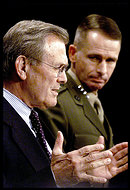Untitled Document
Defense Secretary Pushed for New Powers to Better Deal With Emergencies
Congress has granted unusual authority for the Pentagon to spend as
much as $200 million of its own budget to aid foreign militaries, a break with
the traditional practice of channeling foreign military assistance through the
State Department.
The move, included in a little-noticed provision of the 2006 National
Defense Authorization Act passed last month, marks a legislative victory for
Defense Secretary Donald H. Rumsfeld, who pushed hard for the new powers to
deal with emergency situations.
 |
|
Defense Secretary Donald Rumsfeld, shown in 2002 with Marine Corps Gen. Peter Pace, pushed Congress to give the Pentagon broader authority to finance foreign militaries. (By Joe Marquette -- Associated Press)
|
But it has drawn warnings from foreign policy specialists inside and outside the
government, who say it could lead to growth of a separate military assistance
effort not subject to the same constraints applied to foreign aid programs that
are administered by the State Department. Such constraints are meant to ensure
that aid recipients meet certain standards, including respect for human rights
and protection of legitimate civilian authorities.
"It's important that diplomats remain the ones to make the decisions about
U.S. foreign assistance," said George Withers, a senior fellow at the Washington
Office on Latin America and a former staff member on the House Armed Services
Committee. "They can ensure such decisions are taken in the broader context
of U.S. foreign policy."
Many lawmakers, too, were initially cool to Rumsfeld's request. The Armed Services
committees in both the House and Senate declined to write the provision into
their original defense authorization bills, citing concerns about a lack of
jurisdiction and an absence of detail about where the money would be spent.
But the Pentagon pressed its case, with senior commanders joining top officials
in weighing in with reluctant members.
"This was the most heavily lobbied we've been by the Pentagon in the several
years I've been here," said one Senate staff member. "They really,
really wanted this."
Secretary of State Condoleezza Rice also threw her support behind the measure,
overruling lower-ranking staff members who had argued that existing laws were
sufficient and who had cautioned against granting the Pentagon such flexibility,
department officials said. She joined Rumsfeld last summer in a letter to Congress
urging passage of the legislation.
The initiative addresses an issue that both the Pentagon and the State Department
have identified as crucial in fighting terrorism and bolstering stability abroad
-- namely, "building partnership capacity" in Africa and other developing
regions.
Administration officials complain that attempts to provide such security assistance,
especially in crisis situations, have often been hampered by a patchwork of
legal restrictions and by a division of responsibilities among U.S. government
departments. Improving security in a failing foreign nation, for instance, might
involve drawing on the Pentagon for military training, the State Department
for police training, the Department of Homeland Security for border protection
and the Treasury Department for financial enforcement. Cobbling such pieces
together can take many months, officials say.
After striking out with the Armed Services committees, Pentagon officials found
an ally in Sen. James M. Inhofe (R-Okla.), who has a particular interest in
Africa. Inhofe agreed to propose the new authority on the Senate floor as an
amendment to the Defense Authorization Act. To ensure compliance with existing
foreign aid rules, language was included saying that funds for the missions
would be transferred from the Pentagon to the State Department before being
expended and would be subject to limitations of the Foreign Assistance Act.
These conditions were dropped in a later Senate-House conference. But other
conditions were added still reflecting congressional reservations.
The final version -- Section 1206 of the authorization act -- says the Pentagon
can provide training, equipment and supplies "to build the capacity"
of foreign militaries to conduct counterterrorist operations or join with U.S.
forces in stability operations. But the section also stipulates that orders
for such aid must originate with the president, and it requires the Pentagon
to work closely with the State Department in formulating and implementing the
assistance.
This new authority cannot be used to provide any assistance banned by other
U.S. laws, the provision adds. Further, the measure grants less money than initially
requested -- $200 million instead of $750 million. And it expires after two
years, far short of the open-ended mandate that Rumsfeld had sought.
"We're calling it a pilot program," said Sen. John W. Warner (R-Va.),
chairman of the Armed Services Committee. "But I think it'll prove its
worth."
Defense officials say they are pleased with the outcome. "It's a very
good start," said Jeffrey Nadaner, deputy assistant secretary of defense
for stability operations. "For the Congress, which hasn't done this before,
we think it's a bold, cooperative move."
Reaction at the upper levels of the State Department also has been positive.
Under a separate provision approved with the train-and-equip measure, the department
is getting $200 million from the Pentagon to bolster a new Reconstruction and
Stabilization Office for coordinating civilian assistance. This provision stirred
its own controversy among lawmakers, who as a matter of principle have opposed
shifting Pentagon funds to the State Department.
Having gained this much, the Pentagon and State Department are now setting
their sights on a more ambitious overhaul of foreign assistance rules.
"In the longer run, we need to have our assistance structured in a way
that will give us even broader flexibility," said Philip Zelikow, the State
Department's counselor. "The president and his advisers must be able to
devise a program that can allocate money as needed among whatever agencies have
the skill sets to deliver the capabilities, whether State, Defense, Justice
or other government agencies."

